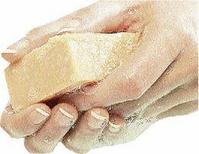Donna McKoy, Contributor
Why do we wash our hands? Mostly, it is because they are dirty and if they are not obviously soiled many persons don't wash. There have been many studies done on the impact of hand washing on the health of the person or those contacted. The results may be surprising.
Danger of germs
Germs are ubiquitous and much time and expense go into removing or controlling the majority of them in a health care environment. Antibiotics, disinfectants, antimicrobials, heat, steam, soap and water are widely used in the struggle to prevent hospital-acquired, or nosocomial, infections. Health care facilities without running water are simply disasters waiting to happen as it has been identified that the most important factor in preventing the spread of germs is clean hands. Yet, these hands can so easily become carriers of infectious organisms, e.g., by coughing into them, touching well-used public areas, such as stair rails, and ineffectively washing after visiting the bathroom. Research has shown that 80 per cent of communicable diseases are spread by touch.
According to Dr. Charles Gerba, microbiologist at the University of Arizona, one-tenth of a gram of faeces can have 100 million salmonella organisms, 10 million viruses or one billion rotaviruses. He has shown that 700 viral particles of the cold virus can linger on your person up to 72 hours after leaving the point of contact, thus having the potential to cause illness in seven people.
It is, therefore, not surprising that colds and diarrhoea are so easily spread in young schoolchildren. The Centres for Disease Control (CDC) in the United States has shown that elementary schoolchildren who effectively wash their hands miss 2.42 days per school year while those with less effective techniques miss 3.02 days.
The American Food and Drug Administration (FDA) also compared preschoolers kept at home with those sent to day-care and found that diarrhea was 30% more common in those in day-care. The effectiveness of proper hand-washing was confirmed in the 2004 Karachi Health soap Study where children were taught how to wash their hands and given plain soap to use. This resulted in a 53% decrease in the incidence of diarrhea, with a shorter duration in those that had diarrhea.
What is the proper hand washing technique?
1. Wet hands with running water
2. Apply soap (solid or liquid)
3. Rub hands together for at least 20 seconds (say ABC's)
4. Clean under the fingernails and between the fingers
5. Rinse hands thoroughly under running water
6. Dry hands properly. Do not use a wet towel
Having properly washed the hands, a dry paper towel should be used to turn off the tap and to open the door as these areas are germ hot zones.
Effective hand washing within hospitals is crucial in the delivery of quality healthcare, yet healthcare workers have such poor rates of compliance. The CDC estimates that 15 per cent of all hospital patients develop some type of nosocomial infections. These infections kill 30,000 people each year and cause illness in 70,000. Nurses and doctors who move between wards and among families and patients can effectively deliver large doses of germs. This can be prevented by using the mechanical action of rubbing the hands together with soap and water to dislodge the germs and flush them away with running water.
In 1843, Dr. Wendell Holmes, an American physician, suspected that 255 of the women delivering in hospital died from a fever transmitted by medical students. He initiated a programme of hand washing using chlorinated water and reduced the mortality rate to less than 1 per cent. It is reported that this so enraged his colleagues that they ordered hand-washing to stop!
In 1846, Dr. Ignaz Semmelweis, an Austrian physician observed that the maternal mortality rate in the clinic operated by medical students was three times higher than that clinic in which deliveries were conducted by mid-wives. He also used chlorine solution to dramatically lower the maternal mortality rate. These studies resulted in the wider acceptance of hand-washing as a means of preventing the spread of pathogens. While this is accepted, practice belies the knowledge. In 1983 at the San Diego conference of Association of Practitioners in Infection Control, Larson and Larson showed that Junior Doctors washed their hands more often when their consultants set the example and abandoned the habit when their seniors did not wash their hands.
We need to remind each other and be more meticulous in our hand washing. Hospital acquired infections increase morbidity (and sometimes mortality), prolong hospital stay and increases cost of treatment. Community acquired infections result in loss in productivity, increased sick days and decreased child health.
FOR YOUR INFORMATION
1. Cold and flu viruses can survive on surfaces for 72 hours
2. There are 20,961 germs per square inch on the average office desk
3. The average toilet set has 49 germs per square inch
4. The computer keyboard has 3,295 germs per square inch
5. The phone, desktop and the microwave handle are the most infectious objects in the office
6.Disinfecting these areas once per day will reduce bacteria by at least 99 per cent
7. Kitchen sponges harbour 7.2 billion germs and should be replaced biweekly
8. The use of alcohol based hand sanitises will reduce the spread of infections.

